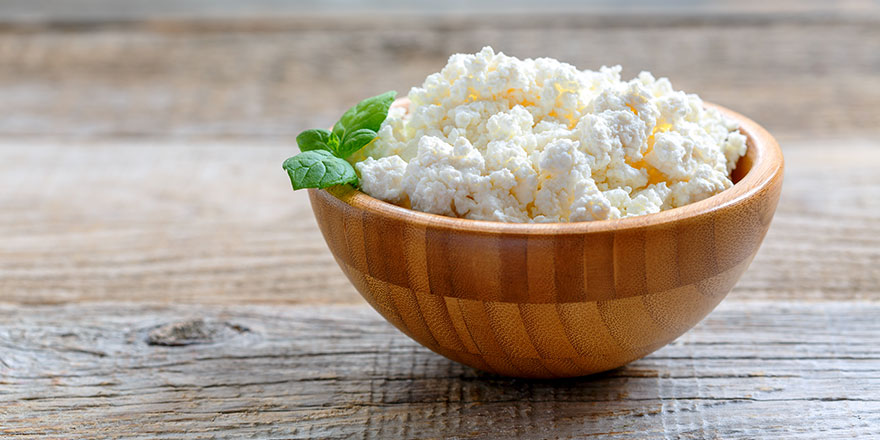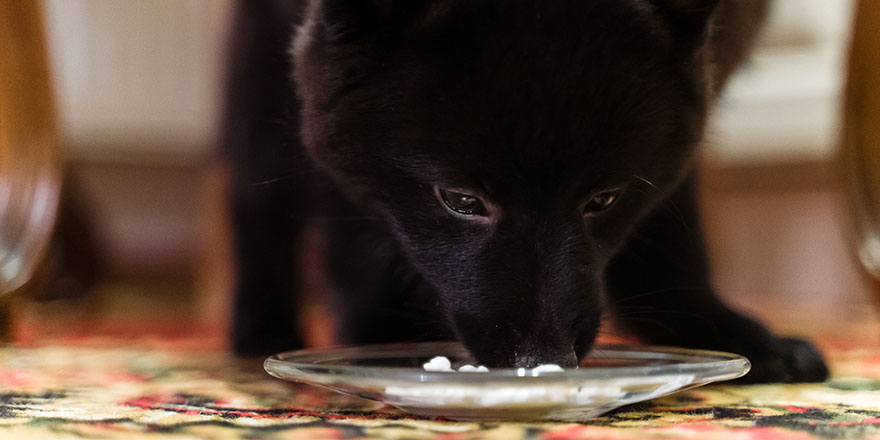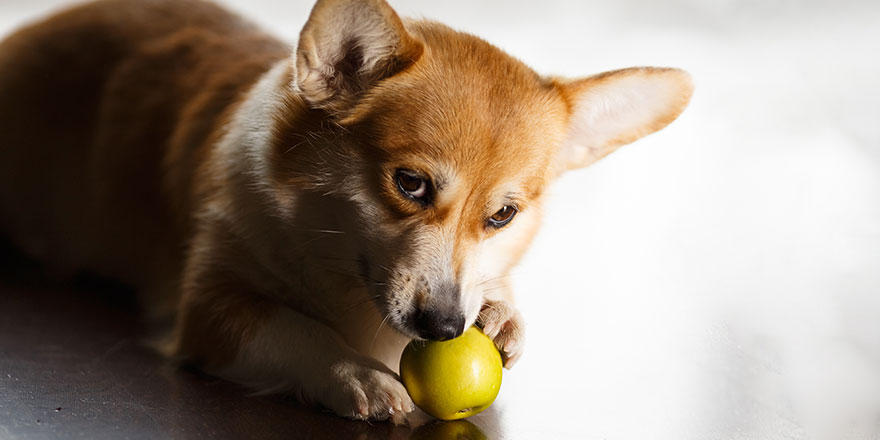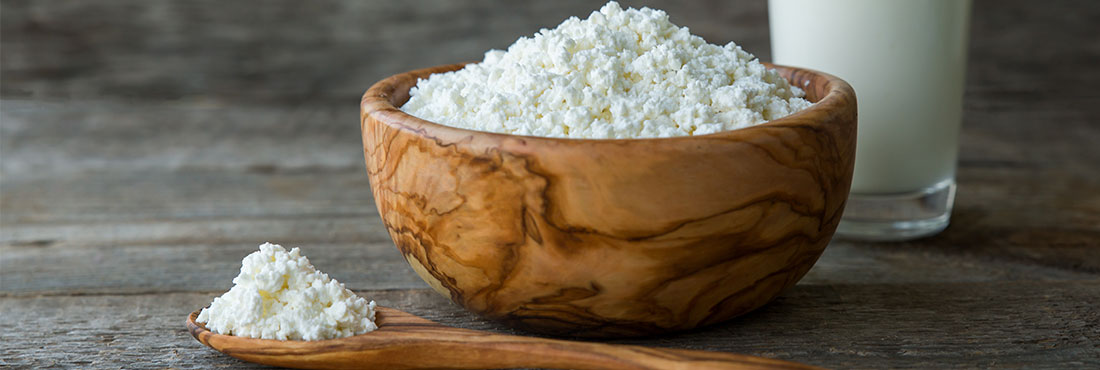As pet owners, we can often be tempted to treat our pooches with a little of our own food. However, as we all know, not all human food is safe for dogs as their digestive systems are different from ours. And the dietary needs of your pet really need to be satisfied by the contents of their own food bowl.
If you do struggle to ignore those puppy dog eyes when eating your lunch, then there are some foods you can give in small amounts. And that brings us to the question – can dogs eat cottage cheese?
Low-fat and healthy for humans, we look at whether it is safe to give cottage cheese to your previous pet.
What is Cottage Cheese?

Cottage cheese is a low-fat cheese made from milk and has a mild, fresh flavor. Unlike many other kinds of cheese, it is not fermented or aged and has a crumbly, moist texture. Cottage cheese is made by mixing lactic acid (vinegar can also be used) with pasteurized milk which causes the milk to curdle and separate.
Low fat cottage cheese can be plain or can come with added ingredients such as pineapple, onions, or chives, to give it a little extra flavor.
Can Dogs Have Cottage Cheese?
It is considered safe for dogs to eat cottage cheese, as long as it is in moderation. In fact, it is the healthiest cheese to treat your pet with as it is low-fat and its soft, loose consistency is easy for canines to digest.
Low-fat cottage cheese can be a nutritious snack as it’s packed with protein and calcium. It is also considered probiotic and so can be beneficial for your dog’s gut health. However, if your dog is lactose-intolerant, cottage cheese can have the opposite effect…more on this shortly.
The Benefits of Cottage Cheese
While we don’t advocate giving cottage cheese to your dog every day, it does come with some notable health benefits:
- According to the United States Department of Agriculture (USDA), cottage cheese contains 11gm of proteins per 100 grams. This makes it a good alternative to meat if your dog has an upset stomach and needs to eat bland food.
- Vets also often recommend a bland diet for dogs, including cottage cheese, plain baked potatoes, chicken breast, and white rice, to help treat short-term diarrhea.
- Cottage cheese is also high in calcium which can help to support the health of your dog’s teeth and bones.
- The magnesium in cottage cheese can also help to regulate your dog’s blood sugar levels, support their heart health, and boost their immune system.
When You Shouldn’t Give Cottage Cheese to Your Dog

Cottage cheese should not become a staple of your dog’s daily diet but should only be used either as an occasional healthy treat or a short-term option if they require a bland food diet. And despite its health benefits, there are several situations where you should avoid giving cottage cheese to your furry friend altogether.
If they are lactose intolerant
Some dogs can struggle to digest dairy due to the lactose it contains so before you try your dog with cottage cheese, you should make sure they are not lactose intolerant.
Known as a disaccharide, lactose is a sugar that is only naturally found in the milk of mammals. While cottage cheese does not contain as much lactose as say, milk or Greek yogurt, this sugar is still present. And for dogs already sensitive to lactose, it can cause them quite a bit of digestive stress.
If you are concerned about lactose intolerance in your dog, the main symptoms to look out for are gas, upset stomach, and diarrhea. A wider dairy allergy can also see your dog experience hives and problems with their skin, swelling, loss of appetite, and, in more serious cases, lethargy and issues with their breathing.
If you do suspect that your dog has lactose intolerance, your vet will be able to carry out an allergy test.
If they are pregnant or nursing
The higher levels of calcium that are found in cottage cheese can be problematic for pregnant or nursing mamma dogs. Calcium-rich foods, especially in the last two weeks of pregnancy, should be avoided as it can raise the risk of low blood calcium and your dog developing the condition, eclampsia.
Cottage cheese can also be problematic for nursing dogs as too much calcium can reduce parathyroid hormone production, increasing the risk of low blood calcium levels.
If they are a puppy
If it’s such a good source of protein, can puppies eat cottage cheese? While care should be taken when feeding human food to any puppy, when it comes to large breed pups, you should avoid giving them cottage cheese and all dairy products altogether. This is because larger breed puppies grow at a faster rate and so need a carefully balanced, canine-appropriate diet to support a pup’s health and development.
And as cottage cheese contains lactose, which can affect the delicate stomachs of all puppies, it is best to wait until they are adults.
If they are overweight
There should be no need to add cottage cheese to your dog’s diet if they are obese or overweight, especially if senior dogs don’t want to fuel more weight gain by adding too much fat. Their regular daily diet should be carefully balanced and appropriate for your pet.
If you are concerned about your dog’s weight, check out our guide on Dog Food for Weight Loss.
If you are in any doubt
Human food such as cottage cheese should not feature as a regular part of a healthy dog’s diet so while dogs can eat cottage cheese, it should always be in moderation. If you are unsure as to whether you can give your particular dog cottage cheese or if they show an adverse reaction, always consult with your veterinarian.
How to Give Your Dog Cottage Cheese
As it is a dairy product, it is best to start with some caution if you are wanting to treat your dog with cottage cheese. Introduce your dog to new foods such as cottage cheese slowly with a small portion to start with and see how they go digesting it.
How much cottage cheese can you actually give your dog? Only ever feed them healthy cottage cheese in moderation – no more than 10% of their daily diet, depending on their size. It is best to see it as an occasional treat or as an option if they are sick and can’t eat other proteins as it is not essential to add to their diet. And too much cheese – even if it is cottage cheese – can trigger pancreatitis.
When it comes to the types of cottage cheese you can give your dog, the best cottage cheese for dogs is plain so make sure you avoid feeding them cottage cheese with:
Onions, garlic, and chives
These ingredients are all from the Allium family which can be highly toxic to dogs. If your dog eats too much of these ingredients, they can develop a condition called hemolytic anemia, which can sadly be fatal.
Pineapple
While fresh pineapple carefully prepared can be a safe treat for dogs that is packed with vitamin C, pineapple found in cottage cheese should be avoided. And this is because the pineapple has most likely been previously canned and stored in syrup, which would make it sugar-heavy.
Too much sugar is not good for dogs as it can contribute to both obesity and dental decay. Pineapple is also high in fiber, which can have an unpleasant impact on your dog’s digestive system.
Artificial sweeteners
Sugar substitutes, especially one called Xylitol, can be toxic for dogs so always read the label on the cottage cheese carton to ensure it is artificial sweetener free.
Alternatives You Can Feed Your Dog

After reading our guide, if you are still unsure about giving your dog cottage cheese or dairy products in general, then there are other healthier options you can use as a treat. And these include seedless apple slices, carrots, and green beans.
A little peanut butter treat is also a super tasty protein boost, just make sure it is not made with artificial sweeteners.
The Final Word On Can Dogs Eat Cottage Cheese
While it is totally fine to feed your dog a little cottage cheese, it’s important to remember that it is not necessary if you are already feeding them a dog-appropriate, nutritionally balanced diet.
Like all dog-safe people’s food, cottage cheese should always be seen as a treat and not a regular habit for you and your dog to get into. And if they do experience the unpleasant symptoms of lactose intolerance, then keep them away from all dairy products, once and for all.
Instead, look for healthier options such as dog-safe fruits and vegetables, and always remember the rule to any treat for your pet – only in moderation.
Source:
- Anna Burke, Can Dogs Drink Milk? – AKC







